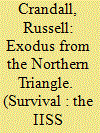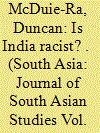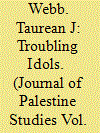| Srl | Item |
| 1 |
ID:
163595


|
|
|
|
|
| Summary/Abstract |
The caravans of migrants that the White House rails against may become larger and more frequent the more it tries to implement its restrictive agenda.
|
|
|
|
|
|
|
|
|
|
|
|
|
|
|
|
| 2 |
ID:
154496


|
|
|
|
|
| Summary/Abstract |
This article discusses the depiction of the exodus myth in advertisements in Israeli secular and religious daily newspapers from 1948 to 2008. Its premise is that advertising as a persuasive communication tool adapts itself to its target audience. As a result, there are notable differences in the use of the myth in advertisements targeting various audiences. A total of 1907 advertisements were examined with the use of quantitative content analysis. The research premise was extensively substantiated and can point to the differential perception of the exodus myth among Israel’s secular and religious populations.
|
|
|
|
|
|
|
|
|
|
|
|
|
|
|
|
| 3 |
ID:
139470


|
|
|
|
|
| Summary/Abstract |
After the 2012 Olympics, Bronze Medal-winning boxer Mary Kom achieved national celebrity status in India. As a member of the Kom tribe, a Tibeto-Burman community from the Northeast region, she has come to represent a region long considered, and self-identifying, as outside the boundaries of the Indian nation. The same week that Mary Kom returned from London, thirty thousand Northeast migrants fled Indian cities fearing racially-motivated attacks. The so-called ‘exodus’ provoked rare conversations on racism within India. During this crisis, the figure of Mary Kom was invoked continually to challenge the existence of racism in India and posit paths to better integration in India's cities. These conversations paid little attention to the brutality perpetrated by the Indian state and military in the Northeast itself and the voices that publicised this brutality. Thus, while Mary Kom has come to represent a Northeast that Indians can embrace, figures such as dissident Irom Sharmila represent a Northeast that Indians wish to forget.
|
|
|
|
|
|
|
|
|
|
|
|
|
|
|
|
| 4 |
ID:
188815


|
|
|
|
|
| Summary/Abstract |
The Taliban takeover of Afghanistan in August 2021 caused a humanitarian catastrophe in the country that triggered en masse exodus of a new wave of Afghan refugees desperate to flee the clutches of the Taliban. Although Pakistan and Iran had traditionally been the two main destinations of refuge for Afghans, yet for some Afghans—especially for the non-Muslim minority communities of Afghanistan, namely the Afghan Hindus and Sikhs—India has always been the foremost destination for refuge. The article aims to understand the experiences of the mentioned communities, as they moved from pre-conflict, to conflict, displacement and finally to the settlement phase in India. Thus, the article throws light on the experiences of Afghan Hindus and Sikhs both in their home and host countries and, in the process, engages with various aspects of the negotiations and marginalisation endured by them. It then strives to explore their sense of belonging at the scales of state, individual and community by discussing the significance and impact of the Citizenship (Amendment) Act, 2019, specifically for the members of Afghan Hindu and Sikh diaspora in India. A plethora of research has been produced that focuses on various aspects of India’s relation with Afghanistan, but the issues of the Afghan religious minorities in India remained a neglected topic of scholarly research. This article attempts to remedy this lack of literature by examining the unexplored dimension of India’s engagement and support for Afghan Sikhs and Hindus.
|
|
|
|
|
|
|
|
|
|
|
|
|
|
|
|
| 5 |
ID:
169416


|
|
|
|
|
| Summary/Abstract |
This article claims that insofar as they continue to omit analyses of colonialism and racialization, retellings of the biblical Exodus and of twentieth-century Black-Jewish relations—two massively significant narratives in the U.S. Black Christian imaginary—will inevitably continue to fuel the Zionist impulse that prevents much of Afro-Christianity from intentionally engaging Palestinian justice. Furthermore, the religious trope of chosenness, along with the dominant narration of the European Jewish Holocaust moment, have provided a politico-ethical basis for a unique type of dispensation that filters the two aforementioned retellings to ultimately deselect non-Jewish Palestinians from a recognizably complex humanity. The tools of the Black radical tradition, however, coupled with a reimagining of coalitional politics, carve out a radical Black Christian sensibility that is best equipped to speak to the devastations of military occupation and racist exclusion and forge life-giving relationships within the freedom struggles against them.
|
|
|
|
|
|
|
|
|
|
|
|
|
|
|
|